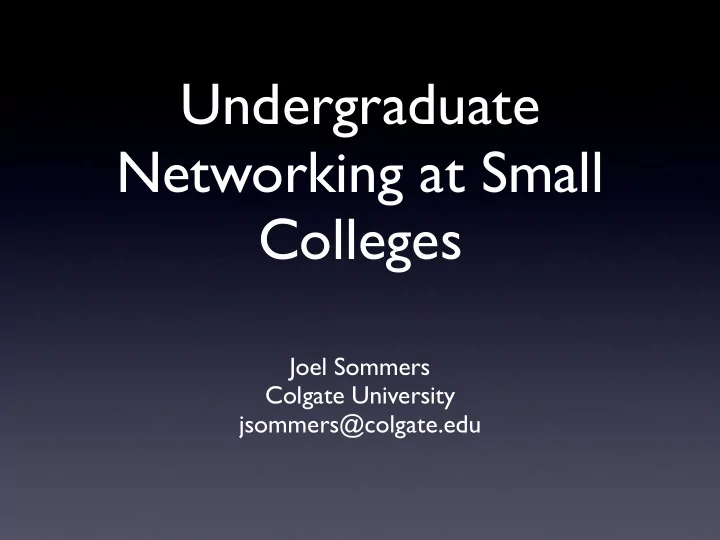

Undergraduate Networking at Small Colleges Joel Sommers Colgate University jsommers@colgate.edu
Undergraduate networking at one particular small college • Colgate University • 2,900 students, 10-25 CS graduates • Two example networking courses at Colgate • COSC 465: Computer networking • Advanced undergraduate networking course • CORE 135: The underside of the internet • Technical and social issues around networking; for non-majors jsommers@colgate.edu 2
What should students learn? • Learning goals should be primary concern • Driven by several factors: fundamental ideas of the discipline, curricular constraints, student expectations and interests, industry trends, ... • Structure: bottom-up, top-down, topic/theme-oriented • Various texts support one or more of these approaches • Some example course materials at http://education.sigcomm.org jsommers@colgate.edu 3
What should students do? • How to achieve the learning goals? • What laboratory activities to support student learning? • Many tools, environments, and approaches developed for practical, hands-on experiences • Two basic approaches • Simulation • Unclear how student learning translates to broadly useful skills • Laboratory, emulation-, and testbed-based approaches • Directly grapple with important scientific & engineering issues in networking • Realism counts a lot! jsommers@colgate.edu 4
Examples of labs I’ve used • Applications • DNS cache / IP longest prefix match lookup (surprisingly popular) • Simplified Twitter clone (fun; used as a backchannel during a couple classes) • HTTP proxy, with or without bells & whistles (students loved node.js) • Implement a reliable transport-layer protocol (in Schooner/Emulab) • Measurement and analysis • Use their own measurement tool (and others) to evaluate characteristics of a small number of Internet paths (in Planetlab) • Evaluate passively collected network measurements (e.g., tcpdump traces, BGP session traces) • Living above the sockets API isn’t enough to get into gooey & interesting details • How to expose students to enough of the guts without overwhelming/horrifying them? jsommers@colgate.edu 5
In the works: “Build an Internet Router” for undergraduates • BIR: grad-level course in which teams of students build a functional IPv4 router • Includes hardware (Verilog) and software components • Based around NetFPGA and VNS • Many networking and software development skills addressed • Ongoing work (with Andrew Moore of Cambridge U.) to develop a set of lab modules based on BIR that address multiple levels of understanding • Examples of modules in progress/planned • Observation: simulation and visualization of a congested queue • Constrained: build ARP functionality; develop and test IP longest prefix match lookup; develop and test intra-domain routing protocol • Semi-constrained: support for traffic monitoring/measurement; integrate firewall functionality jsommers@colgate.edu 6
What about non-majors? • "The underside of the internet": a core scientific perspectives course at Colgate • Technical and scientific underpinnings of the internet • Challenges related to production and consumption of internet-enabled devices • Security and privacy-related challenges • Mainly a discussion-oriented course, but ... • Students get hands-on practice with course concepts in periodic in-class labs • No coding • E.g.: web performance measurement, spam filter investigation, measuring power consumption, scanners and intrusion detection • How to create compelling hands-on experiences for non-majors? jsommers@colgate.edu 7
Challenges / thoughts for discussion • Laboratory resources, setup and maintenance • Lab staff (if they exist) may not have expertise to help • Shared and openly available testbeds can help to address lack of resources • Account creation, management, and system configuration can be (surprisingly?) painful • Depth of student background • Smaller departments can only offer a limited range of systems courses • Debugging on real systems can be hard, even for advanced students • Larger class sizes pose a variety of challenges • No student tutors (TAs) with appropriate experience to assist • Balancing practical (and marketable) skills with helping students develop broad and deep understanding • How to ensure that students are appropriately challenged, and on the “right” things? jsommers@colgate.edu 8
Recommend
More recommend